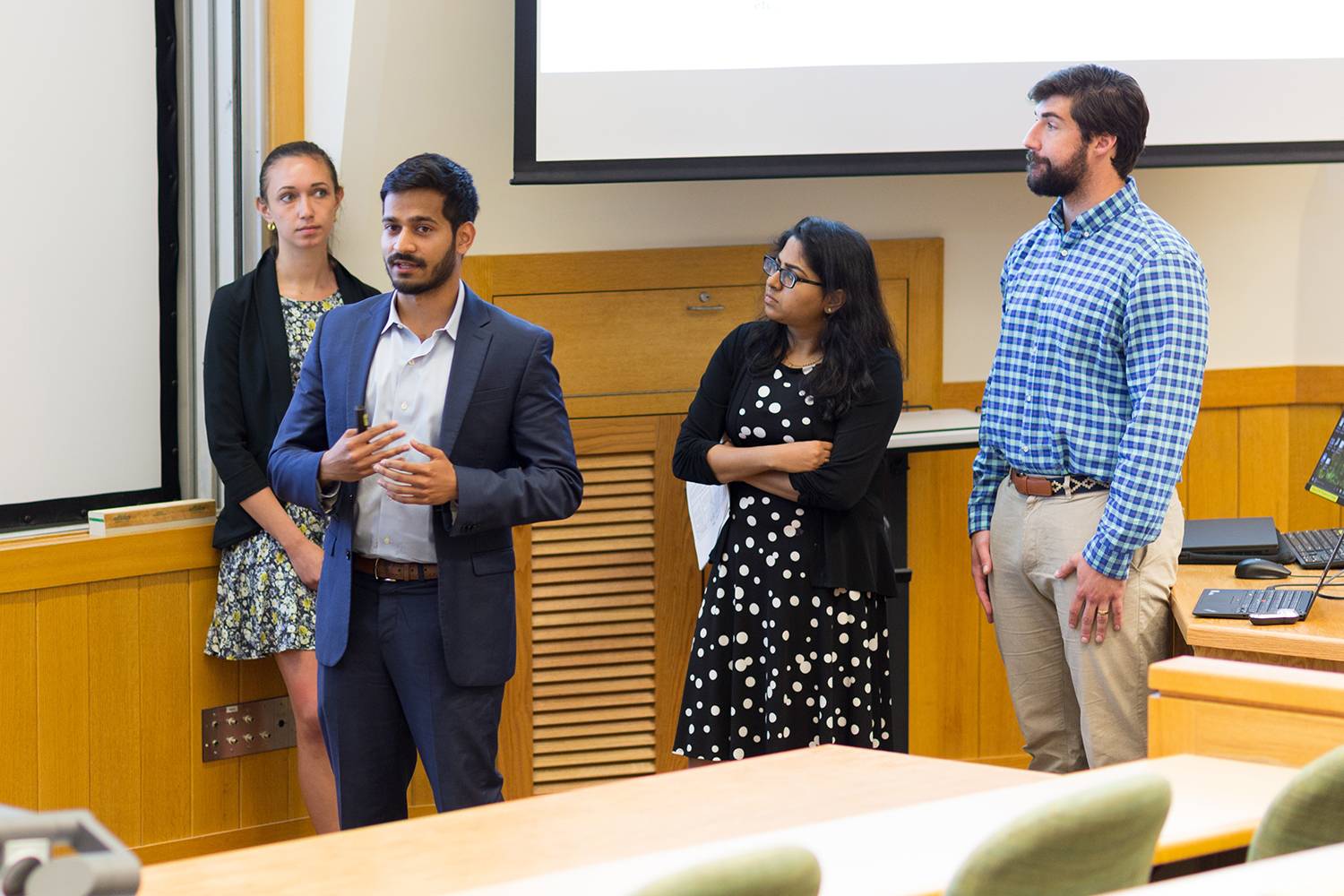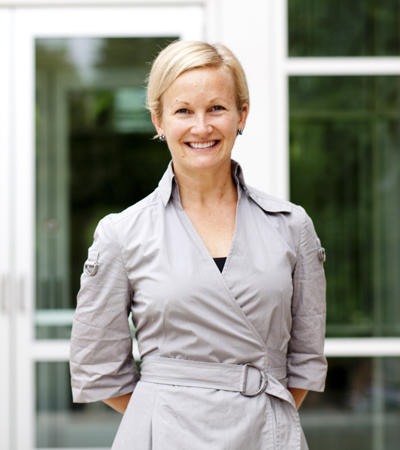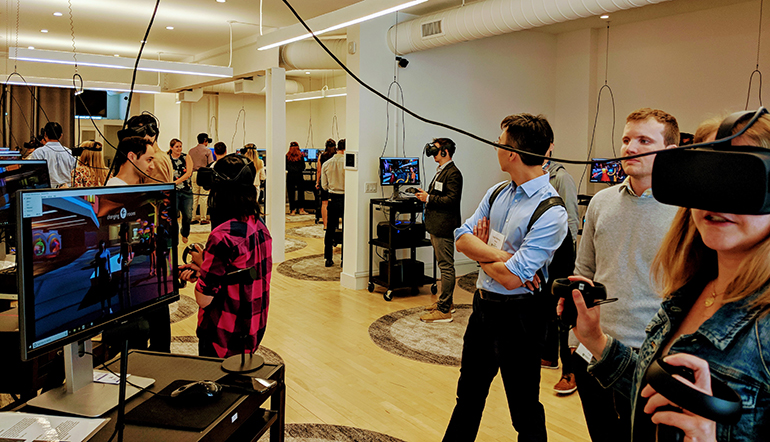A New Home for Entrepreneurship at Tuck
The new Center for Entrepreneurship builds on a strong foundation of programs and support.

The center is launching a new startup incubator in the fall meant to develop student startup ideas over a semester.
In recent years, students interested in entrepreneurship found resources and support at the Center for Private Equity and Entrepreneurship (CPEE).
This summer, Tuck launched the Center for Entrepreneurship, the first center at Tuck devoted to the start-up ecosystem. Headed by faculty director and associate professor Steve Kahl D’91 and executive director Daniella Reichstetter T’07, the Center for Entrepreneurship will build on the strong foundation set by the CPEE, offering new and enhanced courses and programs.
We caught up with Reichstetter to learn more about the new Center for Entrepreneurship and what students can expect from it in the future.
What was the catalyst for giving entrepreneurship its own center at Tuck?
Daniella Reichstetter: The student demand in entrepreneurship has grown tremendously. You can see that in some of the numbers of enrollment in courses as well as the involvement in co-curricular activities, such as the Dartmouth Entrepreneurs Forum and the Maynard Internship Program. Another indicator is the percentage of students going to early-stage companies directly after Tuck. For many years, it was about 7 to 8 percent. In more recent years, it has risen to around 10 percent.
What do you think is causing this heightened interest in entrepreneurship?

Daniella Reichstetter T’07 is the executive director of the Center for Entrepreneurship.
Entrepreneurship has generally enjoyed tailwinds among MBA students in recent years. Tuck is uniquely positioned to support aspiring entrepreneurs—whether they want to found or join a startup—given our tight-knit community and focus on creating well-rounded leaders.
The rise in Tuck entrepreneurship could also be a function of market conditions. There’s currently a lot of venture capital funding available for early-stage companies, which means they have the resources to hire an MBA for an attractive salary. I’ve seen many early-stage companies offer base compensation commensurate with base salaries at well-established consumer package goods companies, for example. When you factor in options packages, flexible work arrangements, and the opportunity to effect change, these offers become really attractive.
How does the center think about its audience?
The new center defines entrepreneurship in a broad, all-encompassing sense. Whether a student wishes to found a company, join an emerging company, or join a high-growth, venture-backed company, they are part of our entrepreneurial ecosystem at Tuck. We also welcome those who are entrepreneurially curious: students who would like some exposure to entrepreneurship but may choose a different career path after Tuck. Some of them have aspirations to take the leap into entrepreneurship later in their career. Some aspire to drive innovation within a larger company. We are here to support students on their individual entrepreneurial paths.
What’s different at the center now that it’s separate from the Center for Private Equity?
This year, we’re working on two new programs. For starters, we’re launching the Tuck Startup Incubator, which will be offered every semester of the year and will be open to any team from around campus in which a Tuck student is involved. This is a new and exciting way for student teams to develop their startup ideas over the course of a semester.
For builders, we are working closely with the Career Development Office and Entrepreneurship Club to put together a more coherent builder resource package. This includes resources on how to find and secure opportunities at early-stage companies, as well as launching a new student mentorship program—career support for first years from second years who pursued a similar path.
We are here to support students on their individual entrepreneurial paths.
We’re also continuing to build out experiential learning opportunities. One such program is the new Ecosystem Deep Dive, a content- and career-focused trek in the Bay Area that we created for incoming first-year students to explore entrepreneurship even before stepping foot on campus. In early August, a group of 22 students visited 15 companies over four days and participated in a number of activities including a design thinking workshop, a visit to a startup’s CA-based factory floor, a tour led by Airbnb’s rapidly-growing Experiences team, and a frank conversation about the challenges of disrupting the health care system with Julie Skaff T’08 and her fantastic team at OODA Health.

Incoming Tuck students participate in the Ecosystem Deep Dive, a content- and career-focused trek in the Bay Area exploring entrepreneurship, before they arrive on campus.
Lastly, the center is helping to infuse more entrepreneurship into TuckGO courses. I will join Professor Steve Powell on the Armenia GIX in the spring, incorporating a new focus on entrepreneurship there. This GIX will joins other GIXs with an entrepreneurial focus including Israel, Morocco, and China. Additionally, we have more entrepreneurial first-year projects than ever before, including both early-stage client teams and student founder teams. So as students are looking at different pathways through Tuck, they can choose among a variety of experiential and global learning opportunities far beyond the classroom to deepen their entrepreneurship skills and knowledge.
Why is entrepreneurship a natural fit for Tuck students?
First, a strong general management education prepares students for all aspects of running a company—this will prove useful in ways aspiring entrepreneurs often can’t imagine until they’ve plunged into the startup world.
Second, one of the things that differentiates Tuck is our uniquely collegial program. Teamwork and a commitment to the community are woven into the fabric of the Tuck experience. When growing an early-stage company, these two qualities are also critical. Most early-stage investors will tell you that they make investment decisions based more on the team than the business idea. Tuck is uniquely positioned to create world-class teams.

